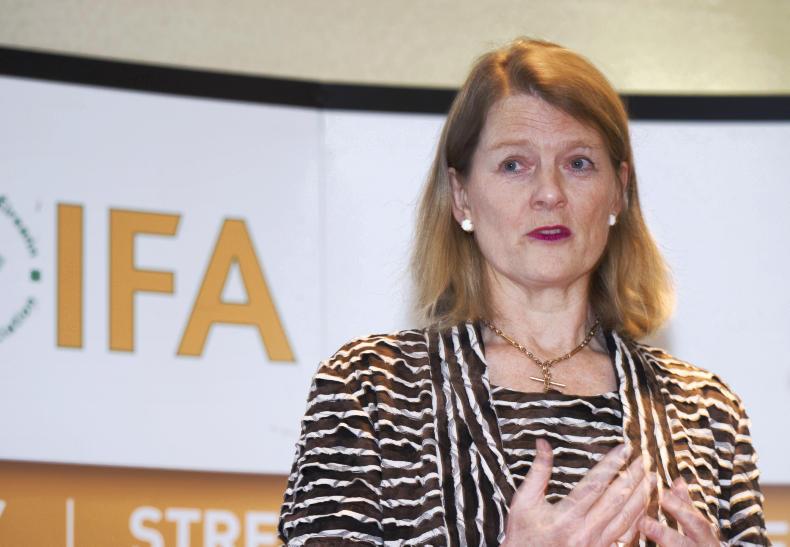In January, UK groceries code adjudicator Christine Tacon sent shockwaves through the UK retail industry after she published the findings of her 11-month investigation into unfair trading practices at Tesco, the country’s largest retailer.
Tacon found that Tesco had seriously breached the grocery code after it deliberately delayed payments to suppliers to boost its own quarterly profit margins.
While the investigation was damning of Tesco, most suppliers and food producers felt that Tacon’s investigation simply confirmed the realities of dealing with large supermarkets.
This week, Tacon travelled to Dublin to address an IFA conference on retail regulation.
Speaking to the Irish Farmers Journal, Tacon said the grocery code and her office came into being in recent years after two competition authority enquiries into the UK retail sector.
Why did the UK government create the groceries code adjudicator’s office?
While consumers were doing very well out of the intense retailer competition, the UK government finally concluded that the accepted risk in the food sector was being passed up the supply chain by the retailers, such that large suppliers were likely to stop investing and that smaller suppliers might go out of business. The net result of this would have been that consumers would have less choice. So essentially my office wasn’t set up as much to protect suppliers as it was to protect consumers.
How is your office funded?
It costs between £0.8m-£1m per year to run the office and is funded by a statutory levy on retailers. Historically, the levy has been split 10% between the 10 UK retailers. This year, however, retailers who had investigations or arbitrations paid more, which ended up with one retailer paying three times more than the retailer who paid the least.
How does your office operate?
We survey food suppliers and publish a league table outlining which retailers have improved in the year and which are most compliant.
Some food companies will say they are afraid to speak up in fear of a backlash from retailers. How do you tackle this?
The survey of food producers and their relationship with retailers is completely anonymous.
What’s to stop the retailer punishing a supplier for coming forward with a complaint once your process is completed?
I have a duty of confidentially that doesn’t allow me to let a retailer even think that a supplier might have spoken to me. So I can’t say, for instance, that I’ve heard a complaint from “a large Irish dairy supplier” when I’m engaging with a retailer.
What happens when you get a complaint?
I generally look to see if other people are saying the same thing and then I will raise it with the retailer. Generally I wouldn’t even say which category I’m talking about because I want the retailer to look for the problem within.
In the Tesco investigation, not a single supplier was named and nobody got any backlash. Last year, somebody said to me that Morrison’s were asking for lump sums and I then heard it from others.
I wrote to David Potts (Morrison’s CEO). Morrison’s then immediately launched an internal investigation and trawled through 66,000 emails until they came back and told me they had found evidence their employees had been asking suppliers for lump sums. Morrison’s paid the money back, and retrained its staff so it wouldn’t happen again.
The only time the retailer would know that a supplier had spoken to me is if the supplier wants to go down the route of asking me to arbitrate on their behalf. This generally only happens when a supplier has a complaint about being delisted.
Do you have power to access information within a retailer?
As it is a statutory investigation, my office has the power to enforce the retailer to turn over anything I ask for. If my investigation finds a breach of the code, I can impose binding recommendations on them. I did this to Tesco and now I have the power to fine up to 1% of UK turnover. I didn’t have that power at the point I launched the Tesco investigation as this power to fine only came in around April 2015.
Are suppliers contacting you about difficulties in getting price increases since Brexit?
Yes. The whole issue of price is very interesting because lots of countries around the world have got stuck on the issue of how to intervene on prices between retailers and suppliers. They are trying to protect farmgate prices but don’t want to affect consumer prices.
So when the UK was designing my office they were very careful to ensure my remit included the trading practices in the retail sector that were unfair but split it from anything to do with price. So they’ve left the price competition exactly as it is. I don’t have any powers over price.
But what I did say to the retailers was that if they renegotiated supply agreements 18 months ago because the price of commodities had gone down, then they now have a duty to engage with their suppliers when prices have gone the other way. They can’t vary the agreement when it suits them and not negotiate when it doesn’t.
Have the retailers really changed their behaviour towards suppliers?
If you look at last year’s survey, 65% of Tesco suppliers said they had improved. Every retailer has improved in the last year except for one which had gone backwards. Of course there is always room for improvement.
Editorial: Ireland needs to follow British lead






 This is a subscriber-only article
This is a subscriber-only article





SHARING OPTIONS: